The role of the Spiritual Healing Coach is to accompany people in their process of healing and inner transformation. More than just a therapist, he is a guide who illuminates the path towards greater harmony and alignment with one’s true nature.
His approach is fundamentally non-directive. It is not about “healing” the other or imposing a ready-made solution, but about creating a space of safety and trust where the person can reconnect with their own inner wisdom. The coach is there to support, encourage, provide a benevolent mirror, but it is always the client who remains the main actor in their healing.
One of the essential qualities of the Spiritual Healing Coach is his deep listening ability. Beyond the words, he is attentive to the silences, the unspoken, the emotions that hide behind the words. He welcomes with a compassionate presence all that emerges, without judgment or hasty interpretation. This quality of presence is therapeutic in itself, as it allows the person to feel truly seen and heard, often for the first time.
The coach is also a facilitator who helps the person to clarify their intentions, to identify the obstacles that prevent them from moving forward and to mobilize their resources to overcome them. He asks questions that invite deeper self-exploration, challenging limiting beliefs, imagining new possibilities. He helps make sense of lived experiences and integrates realizations into everyday life.
But the Spiritual Healing Coach is not just a companion on a psychological and emotional level. He is also a passer between worlds, a mediator who helps restore connection with the subtler dimensions of being. Thanks to his own spiritual practice and his mastery of energetic tools, he creates a bridge between the visible and the invisible. He guides meditations, proposes rituals, uses the power of symbols and imagination to activate the person’s healing potential at all levels.
Another key aspect of his role is transmission. In the course of his own journey, the coach has acquired knowledge, skills, tools that he puts at the service of those he accompanies. He shares spiritual teachings, teaches breathing techniques, visualization, stress management. He gives practical exercises to do between sessions to anchor learning and promote the person’s autonomy. His goal is not to create dependence but on the contrary to give the other the keys to their own healing.
Let’s take the example of Sophie, a 30-year-old woman suffering from a chronic disease and severe anxiety. When she begins to work with a Spiritual Healing Coach, she feels listened to and welcomed like never before. The coach helps her express her fears, angers, buried sadness. He teaches her relaxation and meditation techniques to better manage her stress. Gradually, Sophie regains confidence in herself and her ability to heal. She reconnects with her spirituality and finds a new meaning to her ordeal. Thanks to the coach’s support, she makes concrete changes in her life and sees her health slowly improve.
Ultimately, the role of the Spiritual Healing Coach is to be a catalyst for transformation. Through his presence, listening, skills, he creates the optimal conditions for the person to activate their self-healing power and realize their full potential. More than a profession, it is a true vocation in the service of the awakening and flourishing of the human being in all his dimensions.
Key Points:
– The Spiritual Healing Coach is a guide who accompanies people in their process of healing and inner transformation, with a non-directive approach.
– He creates a space of safety and trust where the person can reconnect with their own inner wisdom, thanks to deep listening and a compassionate presence.
– The coach helps clarify intentions, identify obstacles and mobilize resources to overcome them, asking questions that invite self-exploration.
– He is a mediator who restores the connection with subtle dimensions of being, using energetic tools, meditations, rituals and symbols.
– The coach transmits knowledge, skills and practical tools to promote the person’s autonomy in their healing process.
– His role is to be a catalyst for transformation by creating optimal conditions for activating self-healing power and realizing the full potential of the human being in all dimensions.
👉 To download docx (Editable) file click here : Click here
👉 To download PDF file click here : Click here
👉 To download MP3 file click here : Click here






